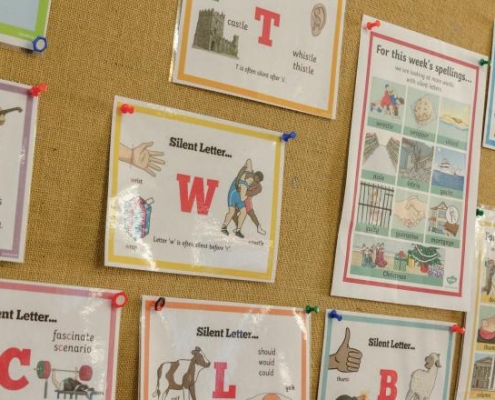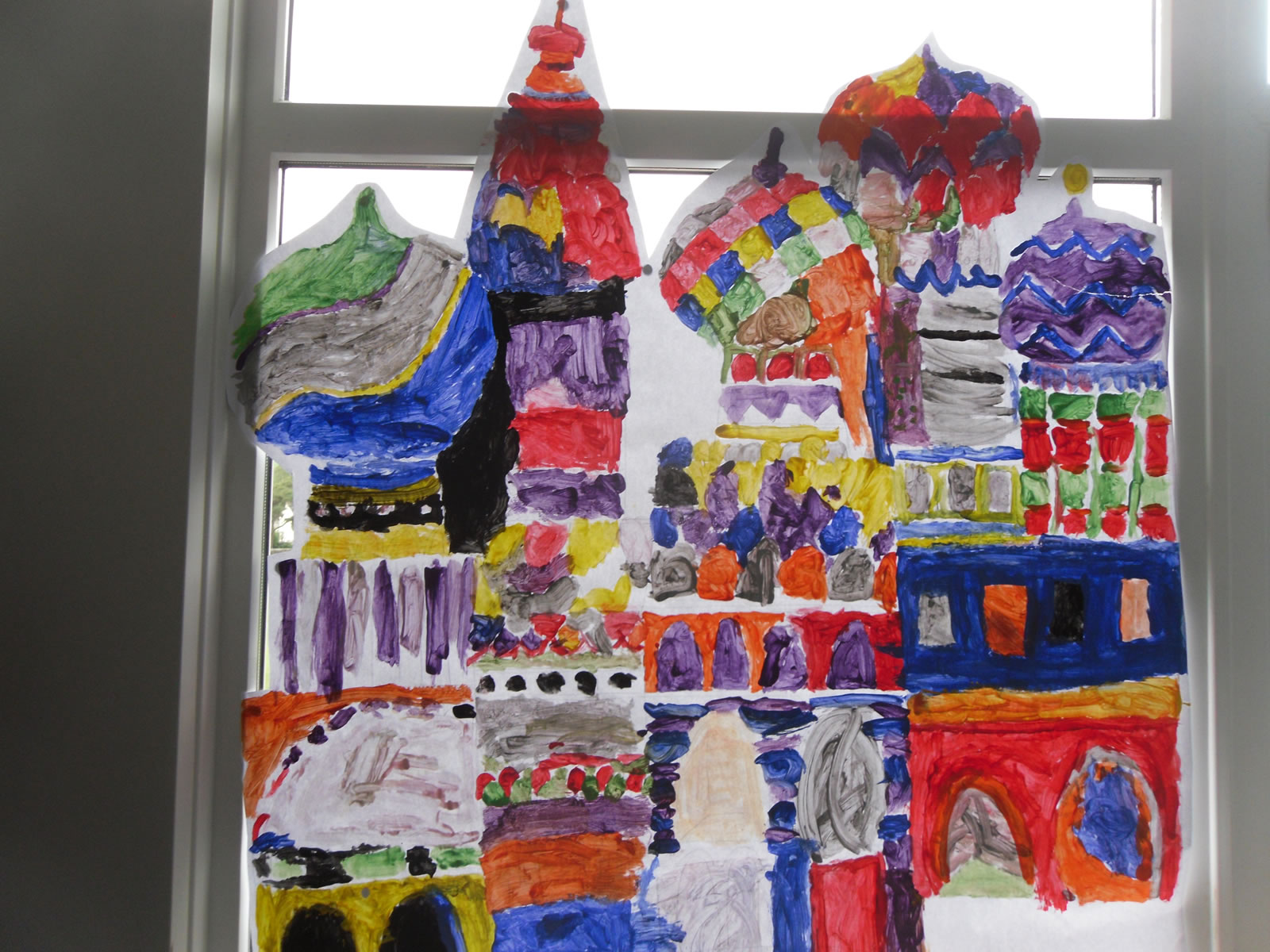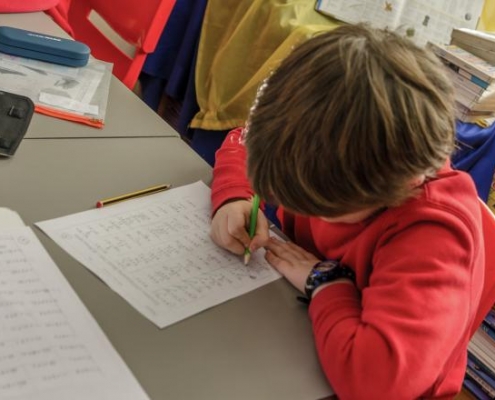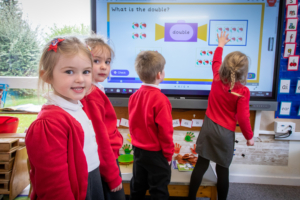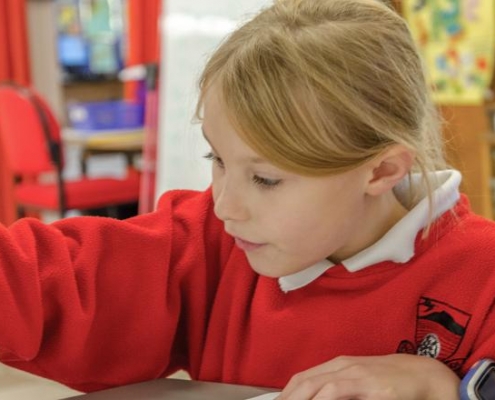Our aim is to create educated citizens for this community by providing a curriculum that celebrates where the children live and acknowledges the need to broaden the children’s experiences and understanding of other communities, both regionally and nationally. Our rigorous, carefully planned curriculum combined with high quality teaching ensures that children are supported to be well rounded, empathetic young people who have a genuine thirst for learning. Children develop a strong sense of moral purpose in addition to a respect for and understanding of people.
CORE CURRICULUM
ENGLISH
Teaching children the basic skills of speaking, listening, reading and writing is high on our list of priorities. Every day our children are taught literacy skills and we aim to instil in our children a lasting love of literature. Our pupils enjoy meaningful writing experiences, speaking and listening activities and drama sessions.
Reading
Writing
Speaking and Listening
MATHEMATICS
Using a range of flexible and innovative teaching approaches, it is our aim to develop pupils who have:
- a positive attitude towards mathematics
- good number sense leading to fluency in both mental and written calculations
- a love of and fascination with the power of mathematics
- competence and confidence in mathematical knowledge, concepts and skills
- an ability to solve problems, to reason, to think logically and to work systematically and accurately
- initiative and an ability to work both independently and in co-operation with others
- an ability to communicate mathematically
- an ability to use and apply mathematics across the curriculum and in real life
- an understanding of mathematics through a process of enquiry and experiment
SCIENCE
Science is taught through observation and investigation of the physical world. We aim to develop enthusiastic scientists who are curious about the world around them. Children are encouraged to interpret their observations, compare, construct and test hypotheses and communicate their results in speech or writing. Units of work from the National Curriculum are linked to topic work wherever possible. We offer a range of exciting experiences which match the needs of all children. Studies of the seasons, plant and animal life and the changes that occur in the natural world continue throughout the year. Staff make good use of our extensive outdoor environment to enrich teaching and learning.
IPS EYFS – Y6 Science Progression in Vocabulary
FOUNDATION SUBJECTS
We place a great deal of emphasis on developing basic skills. We also appreciate the importance of the other subjects that are known as Foundation subjects.
Our children benefit from a broad and balanced curriculum that includes Art, Music, Design Technology, PE, French, RE, PSHE, Computing, History and Geography. We have an exciting and creative theme based curriculum where meaningful links are made between subjects.
PHYSICAL EDUCATION
PE and Games
Children will be given opportunities to explore, develop and control body movement in six main areas of physical education: gymnastics, games, dance and drama, swimming, outdoor and adventurous activities and athletics. The hall is used for P.E. and we are fortunate to have it fitted out with gymnastic apparatus. All outdoor games take place on the playing fields surrounding the school. Year Five pupils have the opportunity to go to Bewerley Park for three days of outdoor education during the spring term. Our PE curriculum is enhanced by many extra-curricular activities and inter-school sporting events. All children are encouraged to participate in competitive sports and we hold inter-house sporting events each half term.
Swimming
At Key Stage 2 all pupils have an entitlement to swimming as part of the National Curriculum requirements for Physical Education. To this end children in Years 3, 4, 5 and 6 go swimming at Ingleton Outdoor Pool each summer term. Year 2 pupils also go swimming as an additional PE activity and this is funded through the Sports Premium.
COMPUTING
In our vastly changing, technological world we believe that it is important to prepare our pupils for the future. They are taught how to use computing tools and different information sources to support learning in all subjects. We are fortunate to have a large number of networked computers as well as interactive whiteboards and projectors. E-safety is a priority.
EARLY YEARS FOUNDATION STAGE
EYFS
Our Early Years classes are all about setting the foundations for a lifelong love of learning through having fun and developing secure relationships with staff and friends. The Early Years curriculum starts with each individual child, they are at the heart of all we do. We follow a loose series of themes around the seasons and children’s interests and love to share stories and instil a love of reading and develop communication and language skills though high quality texts, a carefully planned for environment and most importantly, play. Children have opportunities to develop their skills in all areas of learning. With access to uninterrupted extended periods of play, tailored to their needs as an individual, staff ensure that children develop their understanding of key concepts, knowledge and skills. Through high quality interactions, planning ‘In the Moment’ and some group time activities, every child is given the opportunity to thrive. We have a fantastic outside space and utilise this as much as possible, going outside in all weathers!
PERSONAL, SOCIAL & HEALTH EDUCATION
Aspects of learning filter into all areas of school life including cross curricular topics, lunchtimes, after school clubs and playtimes. Life skills are important, as is learning about British Values and equality.
RELIGIOUS EDUCATION, WORLD VIEWS & ASSEMBLIES
Religious Education & World Views explores big questions about life, in order to find out what people believe and what difference this makes to how they live, so that pupils can make sense of religion and worldviews, reflecting on their own ideas and ways of living. RE gives children opportunities to think for themselves.
Our teaching of RE follows the North Yorkshire Agreed Syllabus for Religious Education 2019 -2024. This agreed syllabus requires that all pupils learn from Christianity in each key stage. In addition pupils will learn from the principal religions represented in the UK, in line with the law. These are Islam, Hinduism, Sikhism, Buddhism and Judaism. Furthermore, children from families where non-religious worldviews are held are represented in almost all of our classrooms. These worldviews, including for example Humanism, will also be the focus for study.
Parents are entitled to withdraw their child from assemblies and religious education provided by the school. Alternative arrangements can be made if requested.
ART
We work to create confident, independent artists who can articulate and value their own creative journeys. By providing a safe and nurturing environment, pupils are encouraged to take creative risks and to learn from the journey, rather than head towards a pre-defined end result. Through our art curriculum, children will become proficient in drawing, painting, sculpture and other art, craft and design techniques.
MUSIC
We use Charanga’s Musical School Programme to teach music. All children receive the required National Curriculum teaching of music that includes both making and appreciating music. Classes have regular singing and music making sessions. There are also opportunities for children to learn to play accordion, cello, violin, keyboard, brass, woodwind and guitar. All children in key stage two learn to play the ukulele with their class as part of the Wider Opportunities music programme.
DESIGN & TECHNOLOGY
Design and Technology is an exciting and creative part of our curriculum. Teachers use a scheme called ‘Projects on a Page’ which allows children and staff to be creative when designing their projects whilst ensuring progression of skills throughout each year group. During their time at IPS, children will:
- develop the creative, technical and practical expertise needed to perform everyday tasks confidently and to participate successfully in an increasingly technological world
- build and apply a repertoire of knowledge, understanding and skills in order to design and make high-quality prototypes and products for a wide range of users
- critique, evaluate and test their ideas and products and the work of others
- understand and apply the principles of nutrition and learn how to cook.
HISTORY
History is taught within a four year cycle of cross curricular topics.
National Curriculum History 2014 ‘helps pupils to understand the complexity of people’s lives, the process of change, the diversity of societies and relationships between different groups, as well as their own identity and the challenges of their time.’ We aim to develop the ability to think as an historian. Examination of artefacts and primary source research is used where possible. Visits to sites of historical interest take place. Drama and role play all play an important part in learning about the past with secondary sources and the use of Information Technology enhancing the curriculum wherever appropriate. Work may be organised to incorporate the whole class or groups of children working together.
Completed work in history may contain many different forms of expression, e.g. writing, use of information technology presentations, drama, art and craft for example.
GEOGRAPHY
Geography in Foundation stage is cover through the knowledge and understanding of the world area. It is taught within a two year cycle at Key Stage 1 and a four year cycle at Key Stage 2.
In Geography we aim to develop the children’s geographical knowledge, skills and understanding in relation to locational knowledge, place knowledge, human and physical geography and geographical skills and fieldwork within the local and wider environment. For example Foundation Stage and Key stage 1 pupils carry out fieldwork in the school grounds, immediate surrounding area and village environment. Year Six pupils for example have the opportunity to go to Edinburgh for three days exploring the city. Children should develop their use of geographical knowledge, understanding and skills to enhance their locational and place knowledge.
Completed work in geography may contain many different forms of expression, e.g. writing, use of information technology presentations, drama, art and craft for example.
MODERN FOREIGN LANGUAGES
Children are taught French from years 3 to 6. Teachers follow the North Yorkshire scheme which covers the National curriculum objectives. We develop children’s, listening, speaking, reading and writing skills in French. The children learn about French culture and ways of life. We develop children’s love of the French languages through games, songs and practical activities.
Reading & Phonics
To enable children to understand the alphabetic code and spell accurately in order to communicate effectively and independently in writing.
SEND
Special Needs and Disabilities
We want to provide the very best education for every single child in our care. All their needs vary and each child is unique. At some stage in their primary education some pupils may require some additional support with aspects of their learning or behaviour.
Learn more about special educational needs and disabilities in children and young people and our inclusive education service.

